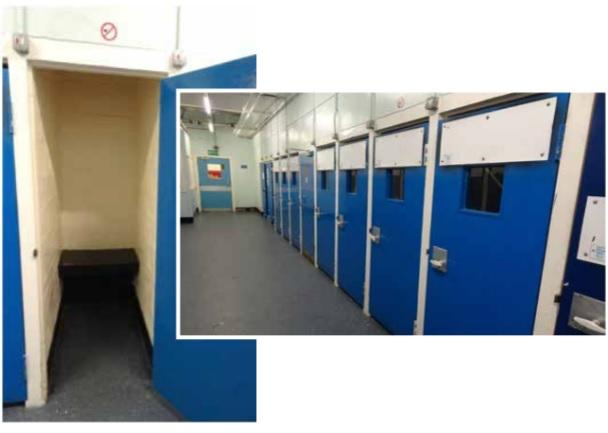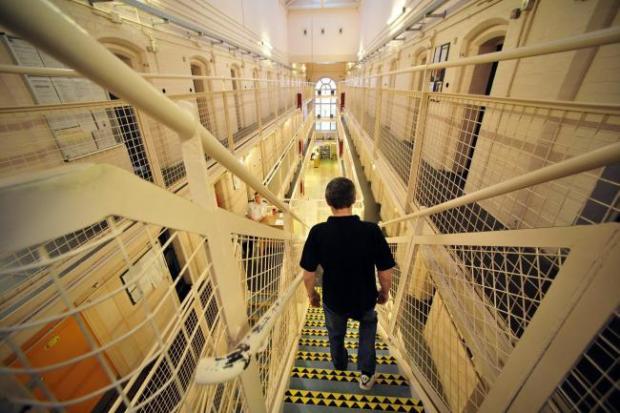A national disgrace: Barlinnie prisoners still held in cells condemned 25 years ago
From the Herald today (27 May), the following article highlights the continuing use of the notorious dog boxes at HMP Barlinnie, Glasgow. These have long been recognised as breaching basic human rights, and were condemned as such a quarter of a century ago. They have never been “fit for purpose”.
PRISONERS in Scotland’s biggest jail are being held in cells condemned nearly 25 years ago for breaching human rights regulations.
The revelation comes in a new inspection of Barlinnie, which says reception holding cells colloquially referred to as ‘dog-boxes’ were “cramped and inhumane” and should be removed or redesigned “as a priority”.
The European Committee for the Prevention of Torture and Inhuman or Degrading Treatment or Punishment and the Committee for the Prevention of Torture (CPT) have both severely criticised the tiny cubicles as breaching the human rights of prisoners.
It comes as HM Inspectorate of Prisons for Scotland said the ageing and “fragile physical infrastructure” meant the prison is “no longer fit for purpose” and said it welcomed the Scottish Government’s commitment to replace it.
But given the length of time before a new prison would be open, interim solutions “must be sought”, it said.
The dog-boxes have previously been described as “essentially cupboards with a bench seat, observation window in the door and no amenities”.

In the past inspectors have observed them as being dirty with graffiti on the walls and cigarette ends and food remains on the floors and benches.
Prisoners who first arrive at the Glasgow jail can spend up to two hours locked in the cells that are no bigger than cubicles.
In the past it was not uncommon for two prisoners to be held in one of these holding cubicles when there is insufficient room for more than one person to sit down.
READ MORE: Could Barlinnie have served its time?
The cells are used when prisoners first arrive at the Glasgow jail and need medical assessments and can remain there initially for two hours. A previous inspection in 2003 described how it is in these cubicles that prisoners hand over their own clothes and are issued with prison clothing.
The latest inspection says the use of the term “dog-boxes” reflects “not only how physically restrictive they are but also the contempt in which they are held by numerous bodies…”
It said that prisoners interviewed who had spent time in them reported feeling “low, frustrated, uncomfortable and anxious” while in them.
“Prison management recognised the international condemnation of the cells but continued to use and justify them in the name of safety,” said the report on the inspection which ran from August 26 to September 6 last year. “It is deeply concerning that these cells were first condemned over 20 years ago and yet no real attempts have been made to provide an alternative.”
Wendy Sinclair-Gieben, the chief inspector of prisons for Scotland says there is a “compelling need for the Scottish Government and the Scottish Prison Service “to recognise and address the Human Rights and rehabilitative concerns”.
She referred to a 2004 case where the then Scottish Executive faced huge compensation claims after a judge ruled that “slopping out” in jails amounted to degrading treatment.
Robert Napier, a remand prisoner at Barlinnie at the time, raised a legal challenge in 2001 under the European Convention on Human Rights, in which he sought £5,000.

“HMP Barlinnie is the largest prison in Scotland and reflects the whole of Scotland’s population crisis,” she said.
“As the original catalyst for investment in the aftermath of the Napier judgement, it is all the more disappointing that the evidence from our most recent inspection of HMP Barlinnie gave the Inspectorate, and the Scottish Human Rights Commission serious concerns.”
She also highlighted the condemnatory words of Clive Fairweather, a former chief inspector of prisons about Barlinnie in 1997 which she said remained as valid during the latest inspection as they were then.
“It is nothing short of a national disgrace that over the years so many have had to endure the conditions resulting from the constant mismatch created between the finite number of cells available and a burgeoning prison population which has been out with SPS Control,” he said.
The Inspectorate was also very concerned that the physical and operational structure of the prison was “inappropriate”for the management of the number of prisoners with disabilities, with a wholly inadequate number of adapted cells for the prison population.
At the time of the inspection, HMP Barlinnie was being asked to accommodate 40% more prisoners than its design capacity. This required “significant numbers” of prisoners to share cells originally designed for one occupant, the report says.
The pressures of overcrowding meant that significant numbers of prisoners were constrained to the minimum requirement of one hour’s exercise in the open air with very little additional out of cell time.
The healthcare facilities were described as being in “severe state of disrepair” posing risk to patients and staff also needed “urgent attention”. The fabric of the building compromised infection control and patient care, the inspection said.
The Scottish Prison Service said plans to refurbish the existing reception and health centre are underway with the new facilities expected to be completed by the summer of 2022. In the longer term, the full replacement of HMP Barlinnie is anticipated to be ready by 2025.
An SPS spokesman added that it welcomed comments from HMIPS that Barlinnie is “safe, well-ordered and benefits from strong leadership”.

The spokesman added: “SPS also welcomes HMIPS’ comments regarding the positive and compassionate attitudes of the staff and their determination to provide a caring and professional service in extremely challenging circumstances.
“SPS is pleased to note that a number of areas of good and innovative practice have been identified including the Recovery café, Radio Station, cultural events and the range of third sector and community partnerships.
“The suspension of court business as well as the Early Release Arrangements during the Covid-19 pandemic has resulted in a reduction in prisoner numbers, therefore easing the pressures over overcrowding.
“SPS is pleased to note that the report recognises efforts of staff at HMP Barlinnie to limit the impact of outdated facilities on prisoners.”
The original article can be found HERE.

![16[2]](https://mojoscotland.org/wp-content/uploads/2024/06/162-1024x768-394x330.jpg)

